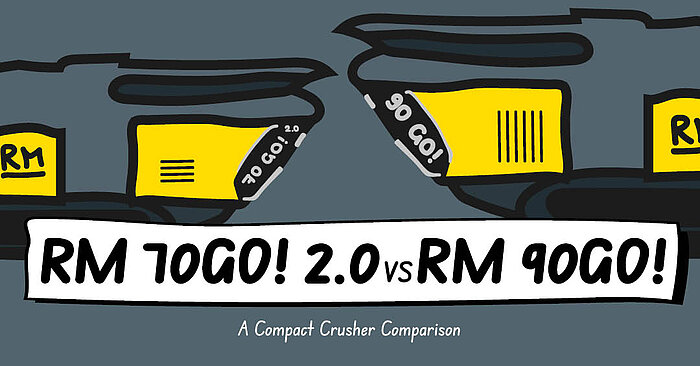Purchasing a compact crusher is a significant investment for any construction or aggregate business. These powerful machines are essential for producing a commodity product, which can be utilized for various construction purposes.
Conducting thorough research and due diligence is crucial as a buyer to ensure you select equipment that meets your needs and provides reliable, long-term performance. Making an informed decision can save you from a costly investment and sunk costs.
What Should You Watch Out For?
This article will dive into the top red flags to watch out for when purchasing a compact crusher. By being aware of these warning signs, you can avoid common traps and ensure your investment is sound.
1. A Used Compact Crusher that is Painted
Purchasing a used compact crusher requires a close look at its condition and wear life. A painted used crusher could indicate masking any damages, which is often referred to as an “aerosol overhaul.” Unless a used crusher is sold and documented as a complete refurbishment, you should question its condition.
2. The "You Can Crush Anything" Lie
If a salesman claims that you can "crush anything", one of 2 things can be the case: This person is straight-up lying or not knowledgeable. Every compact crusher (regardless of jaw or impact crusher) has its limits, and you can’t crush everything.
3. Production Rates That Sound Too Good to be True
Salesmen quoting crusher production rates (especially very high ones compared to other machines in its class) could mean that the salesman is exaggerating or has no experience. No one can guarantee a crusher's production rate. This is especially true in recycling applications where you have no control over the feed. It is a bit different in aggregate applications where you deal with a homogenous product. There are always indications based on past experiences, but this doesn’t mean they apply to your situation.
Here are reasons why production rates vary greatly:
- Feed size and material prep will dictate production.
- Material hardness. Bridge cement or runway concrete is very hard. Sidewalks and flatwork are soft.
- Moisture of the feed will affect production rates.
- Size of your excavator or loader
- Most importantly, the operator’s experience who is feeding the crusher
4. Salesmen Who Try to Sell a Crusher Solely Over the Phone
Hard-selling tactics over the phone are a red flag. Without a site visit, a salesman struggles to assess your needs properly. This could be a strong indication that your counterpart has no experience or simply sells what he has on the lot and not what you need. Price should not be the #1 reason why you purchase a certain crusher. If the compact crusher is not a fit you entered just an exercise of reducing material in size. The right machine will make you money by producing the product you need at the right feed rate.
5. No Parts in North America
Manufacturers without sufficient parts on the shelf have no skin in the game, and you can anticipate that there will be no after-sales service. You are losing money if you can’t keep your compact crusher running.
6. A “Good Used” Crusher for Less Than $100,000
Crushing equipment NEVER gets any better over time. It can be good for its hours and work reasonably well, but it will need parts and labor to get into shape. Compact crushers for less than $100,000 mean that a lot of life has been taken out of the machine and will require work to keep it running.
7. Seller Doesn’t Offer any Start-Up Training
Knowing how to operate a crusher is critical to make more money. If the transaction doesn’t include start-up training, it could mean that the seller is not familiar with the product or is only interested in selling and running from the crusher.
Conclusion: Proper Due Diligence Will Set You Up for Success
Machine quality is rarely an exclusion reason when purchasing a compact crusher. There are hardly any inherently bad machines out there. However, selecting the right crusher and how you use it affect your success. If the selling party is transparent, honest, and focused on support, you can rest assured you get the most out of your investment.






